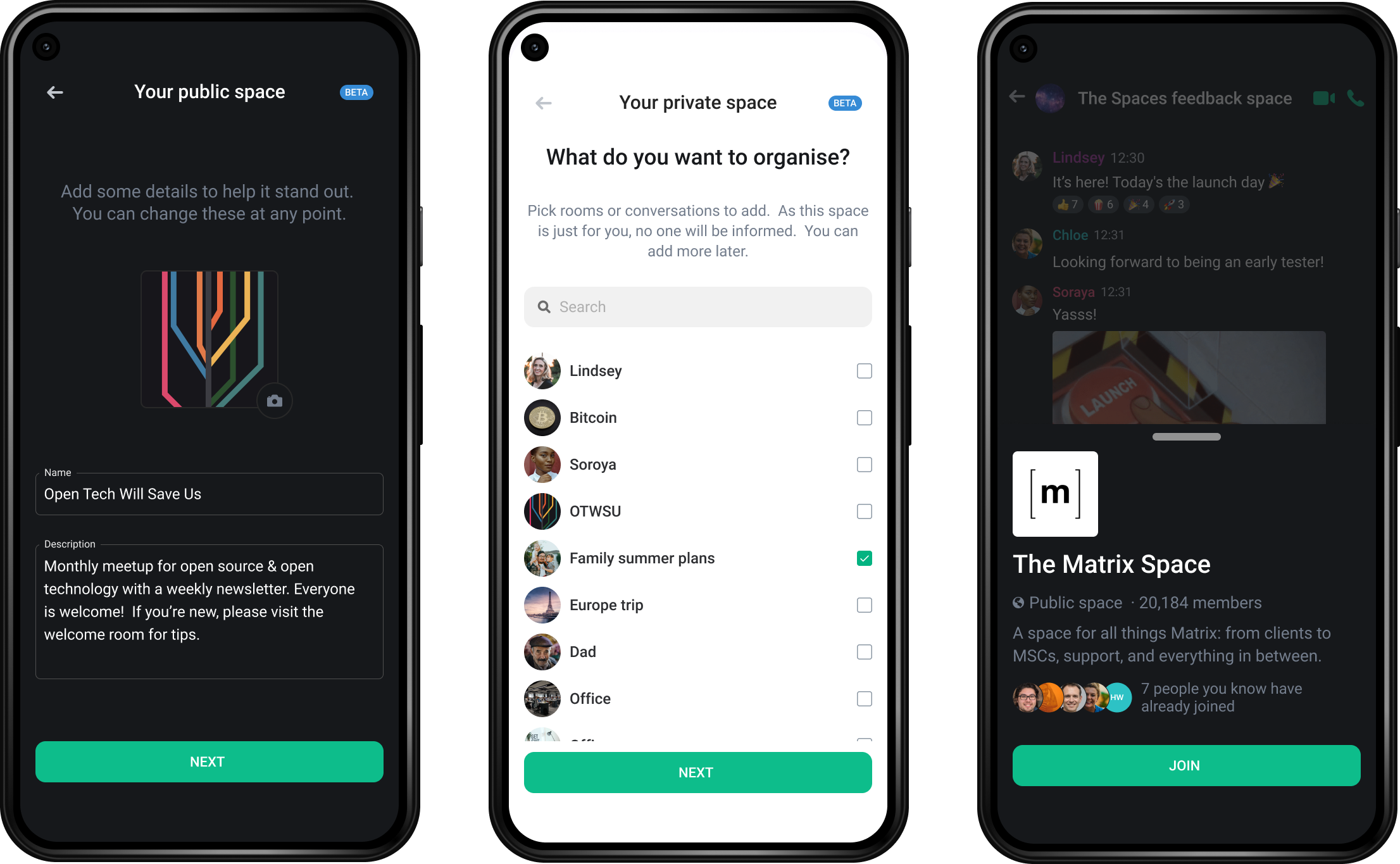When communicating in groups, collaborating at work, or talking in online communities it's common to want to talk about a range of topics with the same set of people.
We want to improve Element to make it easier to do that. Most people either painstakingly create multiple rooms and send invites to each one individually, or they brave our old and unloved Communities feature and hit its many limitations.
Spaces rethink groups in Element and Matrix, and today we’re launching public beta testing on Element Web, Desktop and Android (with iOS coming soon!).
What are Spaces?
Put simply, Spaces are a way to group rooms and people together, and come in three main flavours:
- Public Spaces: Optimised for communities. Easily shared and discovered using links anywhere you'd like.
- Private Spaces: Optimised for teams. Private and invite only, but easily explored by people you trust to join.
- Personal Spaces: Optimised for you. Organise any of your conversations in any way you'd like.

Spaces also make it easy to discover rooms, with room directories for each Space, instead of each server. Spaces also support ‘Suggested rooms’ which let admins mark rooms they think might be useful to everyone in the Space.
How can I test Spaces?
Spaces are available now on Element Web, Element Desktop and Element Android. Once you're up to date, come join us in the Matrix Community Space!
On the Web & Desktop, you can enable and disable the beta by clicking on the (+) icon in the now affectionately titled Space panel. On Android, just update to the latest version on Google Play or F-Droid.
On iOS, we're still busy implementing Spaces. However if you join rooms which belong to Spaces, you’ll still be able to talk in them.
We need to go deeper
While researching Spaces, we discovered people feel constrained by the limitations of the most popular platforms today. For example, the structure which makes sense to an admin, moderator or manager might differ from the best or most productive view of the same conversations. This led us to Personal Spaces, which will replace Element’s old ‘custom tags’ easter egg.
Similarly, we found people are constrained by single column flat lists of conversations— which lack the flexibility needed to organise information with any relative sense of importance, value or area. To that end, the same way Spaces contain rooms, they can also contain other Spaces! This allows you to build whatever hierarchy of information you want to, as flexibly as you organise files and folders.
Using Spaces and Subspaces to build hierarchies effectively turns Matrix into a global decentralised filesystem for conversations and other real-time data! There are a few rough edges in them today, but we’re shipping now to get feedback sooner (more on that below).
What's next?
We would love your feedback! In app, you can submit feedback which helps us iterate, prioritise and ensure we're solving the right problems. You can also join us in the Spaces feedback room.
Things we have planned to ship as we continue to progress the beta include:
- Auto-joining rooms when joining a Space— to ensure visitors or members see and participate in the same communal rooms.
- User permissions which cascade from Spaces to rooms— to allow admins and moderators of Spaces to be able to manage all rooms, and ease managing your Space when you remove people from them.
- Maturing Subspaces and Space hierarchies— smoothing over rough edges, building out public Space hierarchies and exploring drag and drop interfaces. We think hierarchical Spaces will be a paradigm shift in Element and Matrix, and they’re our love letter to the raw power and flexibility of Usenet and other giants before us.
- Improving onboarding into Spaces— from email invites to how you preview Spaces, to let you make better decisions about which Spaces you want to join.
- Space bridges— to unify communications across multiple workspaces, services and apps (here's a sneak preview of an early MS Teams bridge).
- Outstanding feature implementations on iOS.
Ultimately, we’re working towards making Spaces useful and stable enough to exit beta, and formally replace our old Communities feature.
Building Spaces required a new approach to building features in Element and Matrix. The original Matrix Spec Change proposal was led by design thinking, prototyping and testing up front, with a dedicated cross-functional team spanning design, product, mobile, web and backend engineering. Since we previewed Spaces at FOSDEM we’ve been testing and iterating on the user experience— and as the beta progresses it’s only going to get better!
We’ve spent significant time trying to get this right. The resulting difference in quality should hopefully be obvious, while also setting the foundations for advancing and improving Element’s usability moving forward. Huge kudos to the team for getting to this milestone.
We hope Spaces help you organise your conversations in ways you haven’t been able to before!



